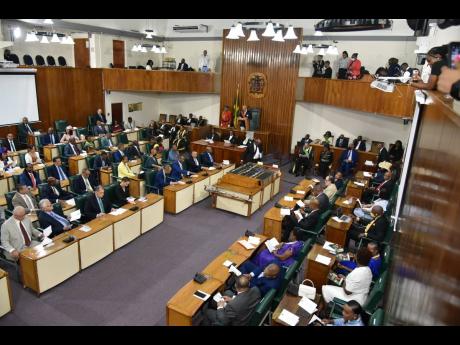Kristen Gyles | Society of inequity – apples are not oranges
We tried. Despite protests, pleas and proposals for more equitable remuneration across the public sector, the government seems to have put on its blinkers and its earmuffs and is moving full-speed ahead with its decision to grant increases well in excess of 200 per cent to some politicians and high-ranking members of the public sector. At whose expense? Those who offer some of the most essential services and keep the wheels of society turning.
The politicians and their sympathisers have argued that although salaries for members of parliament (MPs) and cabinet ministers have been doubled and tripled, so have the salaries of some other classes of workers within the public sector. So, they say, if we complain about the massive salary increases for politicians, we must keep the same energy for the teachers, some of whom have seen their salaries double.
Okay, let’s see.
Most public sector workers have got increases in the region of 20 to 30 per cent. By the government’s own admission, this was deliberately not the case for many public sector workers in leadership, however, who were targeted for much more seizable increases. The rationale given for this is that the little people within the public sector need motivation to work towards leadership.
As discussed last week, unless the aim is to demoralise workers, create hostile work environments characterised by toxic levels of competition, and establish that those who aren’t bustling for leadership positions are ambitionless, such a strategy is no good. No one is motivated by a slap in the face, but rather, they are insulted by it.
HIGHEST PERCENTAGE INCREASES
So, as a starting point, let’s first establish that the classes of public sector workers who are generally paid the most have generally been given the highest percentage increases. Politicians are among the recipients of the highest band of increases. There is therefore no comparison between the increases granted to politicians and those granted to teachers, nurses or any other professional group as a whole. However, let us humour those who have been trying to make this case.
In 2021, a member of parliament would have been entitled to just over $4 million for a year of service. At the same time the average teacher within the public sector would have been entitled to roughly $1.5 million. If the member of parliament and the teacher were both to be awarded equal increases of 100 per cent, their salaries would double to $8 million and $3 million, respectively.
If based on the cost of living, the average Jamaican needs an estimated $3 million to survive comfortably, then notwithstanding both workers having been given equal percentage increases, one would be able to comfortably lead a double life, perhaps taking care of a second family entirely, with change to spare, while the other would be just about able to make it by each month living hand to mouth. The point is that a 100 per cent salary increase awarded to a previously underpaid group of workers who were living just above the poverty line is not the same as a 100 per cent salary increase awarded to a government official who was already living the good life.
If the goal is to reform the public sector compensation system to make it more equitable, how exactly does equal percentage increases achieve that? And if equal percentage increases doesn’t achieve the goal, large percentage increases for those who are already well-paid and small percentage increases for the poorest, certainly doesn’t.
It also seems that from the onset, there has been a tendency for those justifying the excessive increases to make comparisons between Jamaican politicians and those of other countries. When it’s not a comparison between the prime minister’s salary and that of the president of the United States, it’s a comparison between members of parliament in Jamaica and members of parliament in the United Kingdom. As far as accountability goes, MPs are representatives of their constituents. If the constituents are sad, hungry and living in squalor, so should be those who represent them.
BASELESS COMPARISONS
These baseless comparisons involving political representatives of other countries where the average adult citizen is a homeowner, owns a functioning vehicle and can afford education at all levels, is ludicrous. Apples aren’t oranges! If a comparison is going to be made between MPs across various countries, let’s also compare the corresponding output and standard of living in each country. If there is no evidence of comfort, stability or security for the constituents, the political representative cannot expect to be shovelling in truckloads of cash from the national purse as a salary.
It’s even worse when the comparison shifts between politicians and private sector CEOs. Oh please. No private-run organisation needs to justify to the country why it pays its CEO what it does. The government, however, has a duty to justify why it pays the employees of the country what it does. There is no comparison. The private sector, which operates strictly based off a profit motive won’t always reflect the pay equity that is expected of government.
If politicians want the pay of a private sector CEO, they should enter the private sector and leave service and representation to people who actually want to serve and represent. As a friend of mine puts it, too many of our politicians “come fi milk cow, and nuh come fi feed it.”
Kristen Gyles is a free-thinking public affairs opinionator. Send feedback to kristengyles@gmail.com

